Model of King Orry I
[From The Manxman, #9 1913]
"What surprises me most is that tourists are never tired of boasting that it is a sea voyage they most delight in, but yet.; if the Isle of Man boat does not do the passage in three hours, they do nothing but grumble (laughter). It is' up' to Cammell, Laird's to maintain their reputation" (cheers) - Mr. Maitland, at the launch.
Although I have got some more curious extracts from the old Steampacket minute books of the " thirties " ready for my readers, who, I have reason to believe, appreciate them, I think it would be far better this month to deal with the three King Orry's. You know we have already had the three Tynwald's put on our record, and, now that we have got a third King Orry afloat, it seems only the proper thing to deal with that famous line of Kings. You will re-call my having previously stated that I do not put the, history of our packets in chronological order. All my endeavour is to hunt up everything possible about their early history, print it soundly in black and white, and from this to subsequently re-write a connected logical story.
Well, here we are in 1913, or the eighty-third year of the life of our now venerable enterprise, and we duly possess a third King Orry. The Steampacket Company is the only concern in the world, so far as I am aware, that have made the re-naming of their old ships a definite policy. Never has any idea been happier or more successful. A few other companies have done it tentatively and erratically, but never regularly. The White Star line have a second Oceanic, Celtic, Adriatic, etc., and are building another Britannic, but that is about all. The P.S.N.C., who used, by the way, to have a Lusitania many years ago, have done it to a small extent. The Cunard people have never done it at all, and this, I think, is a great mistake.
Now, look here, times without number trippers seem to take a delight in getting muddled about the names of the boats and the years they ran. Smith, for instance, offers to bet somebody so much that he crossed in the first so and so in the year so and so. Enquired into one generally finds that the first so and so was broken up before he originally went to the Island, or perhaps before he was born, and thus he really means the second. Let us therefore, print a correct list. Seven of the Manx fleet have been named after predecessors for the third time, namely-
| First. | Second. | Third. | |
| 'Mona's Isle | 1830 | 1860 | 1882 |
| Mona | 1832 | 1878 | 1903 |
| King Orry . | 1842 | 1871 | 1913 |
| Ben-my-Chree | 1845 | 1875 | 1908 |
| Tynwald | 1846 | 1866 | 1891 |
| Douglas | 1858 | 1864 | 1901 |
| Snaefell | 1863 | 1876 | 1910 |
one steamer has been re-named for the second time only, namely : Mona's Queen ...... 1852 ... 1885
This, therefore, makes twenty-three vessels who have had but eight names between them, and there are eleven others who have had eleven names, or one for each. They are : Queen of the Isle (1834), Fenella (1881), Ellan Vannin (1883), Peveril (1884), Queen Victoria and Prince of Wales (1889), Empress Queen (1897), Viking (1906), Tyrconnell (1910), and The Ramsey and Peel Castle (1912), which makes a total of thirty-four ships from 1830 to the present day, or one every 2½ years from the start. Twenty-one were -paddle and thirteen screw steamers. In addition, about a dozen others have been temporarily chartered in various years. Although I could never discover what Queen of the Isle had done not to be re-established, I don't think that more than two or three of the remaining ten names will ever be used again. However, above we have a list; and thus friendly disputations about the ships need not occur again.
![]()
Model of King Orry I
Next, I should say that this is an appropriate occasion to ask, Who was King Orry? Of my own personal knowledge I do not know, but " oral tradition " has it that King Orry, or Goree-probably a corruption of Godfrey-was a son of a. King of Denmark, and that he landed on the island abort A D. 938, or 128 years before William the Conqueror began to civilise ourselves. Tradition, in many directions, has been very busy about this gentleman. They say that a deputation met him when he landed, and asked him from whence he came. He was a real good sort, a righteous man. He pointed upwards, to the Milky Way (I suppose he must have been a bit of an astronomer also), and said, "That is the way to my country." So Manxmen, to this day, call the great celestial phenomenon of the heavens, Raod-Movar-ree-Gorreethe great road of King Orry. The Manx historian, Edward Callow, says : - " This King Orry it was who instituted the first representative Parliament the world ever saw. The representatives were Taxiaxi, and subsequently Keys. I am glad they downed a word which sounded like Taxes, because those objectionable things are not very heavy in the Isle of Man."
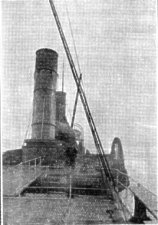
King Orry II. last November
Colonel Hughes, her old friend, is seen standing on the deck. The wheels and paddle boxes are gone. The Colonel kindly took all these photographs
I have several times found the present Prime Minister, and Lord Rosebery, and one or two others, calling the British House of Commons the mother of Parliaments," and so, on behalf of the Little Manx nation, I respectfully beg to hurl the words back at them as well as administering, herewith, a stern reproof. Put another way, it is the commonest belief that the House of Keys is, without doubt, the earliest' Parliament which ever assembled. Furthermore,' they will tell you on the Island that Bishops of Sodor and Man go back in direct line beyond the first Archbishop of Canterbury. Oh: it's a right little, tight little island anyhow. ,
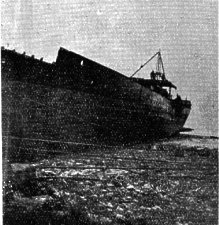
King Orry II. She takes a lot of breaking up
King Orry was succeeded by twelve others, all from the original stock, which I would call another point in his favour, the more particularly as they were all very decent fellows, indeed. King Orry is popularly supposed to be buried in the roadside, near Laxey, and the " oral tradition," which I have to rely upon, asserts that they sodded the dead King up on his live horse as a peculiar mark of honour. This strikes me as a singular way of bestowing honour on a King, but, as I was not there to see, I must leave you to do your best towards believing the affair to be true.
As we have already published a good deal about King Orry (I.), I suggest that back issues of the " Three-legged Magazine " be consulted concerning her. You know that she was the only one of the fleet to have been built at Douglas. There were excellent ship carpenters on the Island in those days, and, indeed, they are good yet, but a little out of practice, for wooden steamers are not very popular just now.
The first entry in the minutes having reference to the then proposed King Orry occurs in 1841. An interview had been arranged between the director and " Mr. Napier, Mr. Aiken, and Mr. Winram." It appears that they contemplated a vessel " not less than 136 feet long, or 5 feet longer than the Queen of the Isle; of 25 feet beam," which was also 5 feet more than that of the " Queen," so as to give " increased buoyancy " as well as " cabin room and room for the storage of goods." She was to carry 100 tons weight upon a draught of 9 feet 6 inches, and to have a depth of hold of 15 feet 8 inches, with " engines of 180 horse power, having a 5 feet stroke." In one way or another she seems to me to have been a regular " five footer." I know she turned out a " sure footer." The minute ends with the information that " a vessel of the foregoing dimensions will cost nearly £12,000." I suppose this would have been considered a tremendous amount in 1841, but I think that Messrs. Cammell, Laird, and Co. will want a little more to-day. However, £12,000 will be spent on odds and ends, and nick-packs and beautifications on King Orry (III.), so that will be all right.
Here it should be stated that Aiken was a Liverpool shipbuilder, and Winram one in Douglas. Aiken held the contract, but the ship was built at Winram's yard-somewhere about the north-end of Walpole Avenue-and the pair seem to have worked together. By the way, the minute, written at the time, calls the Liverpool man Aiken, while other authorities subsequently printed him Aitken, so I leave you the choice for yourself. The tender was accepted on May 4th, 1841, and the price was to be £11 per ton. I believe she was 433 tons, so that would make it £4,763. Then,
"They recommend that the engines be supplied by the Company's proved friend, Mr. R. Napier, whose price will be £6,000."
Thus the total looks like £10,763. But there must have been " extras, " and so the £12,000 forecast seems to have been a sound and cautious one. You may well imagine that Manxmen took an immense pride in the ship which they helped to build themselves, and they did it so strongly that King Orry (I.) was not so fast as some of the others. On November 24th, 1841, they decided upon her name, the following being proposed :-Maid of Mona, Mannin MacLear, Manx Man, King Orry, and Prince of Wales. Proposed by Mr. E. M. Gawne, and carried by a majority of ten votes King Orry.
She was towed to Glasgow, by, I think, the Mona's Isle (I.), so that Napier could put the engines and boilers in. That was in 1842. Mr. William Heatherington, who is, as you know, active, hale, and hearty, and now living in Liverpool, stood on Maughold Head, Ramsey, and watched the two ships go past. Does that strike you as a very singular record? It does me. She ran without a flaw or a mishap till 1858, when Napier took her as part payment for Douglas (I.). He sold her to a foreign firm, and she traded successfully for many years in Eastern Europe-the Islands, Turkey, the Dardanelles, and so on. The late Captain Faragher once picked her up at Galatz, in charge of an affable Greek, who, in broken English, entertained him to a marvellous account of the Island from whence his ship had come-where every person had three legs, and no animal any tail.
I might have mentioned that, by 1853, she had become the cargo boat, carrying " goods from Liverpool on Mondays and Thursdays, and from Douglas on Tuesdays and Fridays," but the following was attractively added to the notice:
Passengers embark on board of, and land from, the Packets at Liverpool, and generally at Douglas, without the inconvenience of small boats.
A tidal service, I'll be bound ! At that time there was neither landing stage at Liverpool nor landing pier at Douglas. Oh! what splendid non-grumblers our forefathers must have been. King Orry (I.) was first commanded by Captain William Gill, for ever famous as the discoverer of the channel into Liverpool.
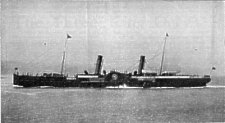
King Orry II. The wonderful ship which sailed successfully for 41 years.
In 1871 she was the finest model afloat
By 1871 people were finding their way to the Island in largely increasing numbers, so that the company decided to build a ship finer and faster than had ever been contemplated before. This was King Orry (II.), 260ft. long by 29ft. beam by l4å-ft. deep, with an indicated horse-power of 4,000, and the old firm of R. Duncan & Co., of Glasgow, constructed her. Up to that time the largest boat in the service was Tynwald (II.), built by Caird & Co., in 1866, her size being 240ft. by 26ft. by 14ft., and of 2,800 horse-power. To-day Ben-my-Chree (III.) is 400ft. by 462ft. by 20ft., and of 14,000 horse-power.
The King Orry above-mentioned ran without mishap all those forty-one years, down to August last. So good a hull was hers that she brought a high price for breaking up, and Captain Quine subsequently ran her adroitly ashore on the banks of the Dee, and delivered her to her new owners for that purpose.
Anyone might have thought that that, in a public sense, was the end-and at a good old age, too-of the King Orry. The following, however, appeared in a North Wales paper :
KING ORRY AND THE HOSPITAL.-Mr. Walter O. Jones, auctioneer, has been commissioned to sell the fittings, &c., of the steamer King Orry, which for years was well known in the fleet of passenger steamers, from Liverpool to the Isle of Man, and which now lies at Llanerchymor. Messrs. Ellis, who have charge of the boat, make a charge of twopence for going over the vessel, and the amount so received is handed over to the funds of the Holywell Cottage Hospital. The opportunity to view the vessel was taken advantage of by a great many people during this week, with the result that the sum of £5 14s. 1d. has already been received by the hospital secretary (Mr. W. H. Roberts) from Messrs. Ellis as the first instalment.
Thus the old ship had already made a " fiver " for charities, and was on the way of increasing it to £10. Next, so great was the general interest taken in her that the idea occurred to those concerned to test whether the public would like to acquire some " trophies " from her and accordingly the following was issued :
PRELIMINARY NOTICE OF IMPORTANT SALE
OF THE COSTLY
APPOINTMENTS, FURNITURE, FITTINGS, CARPETS, &C.,
of the Steamer
KING ORRY,
Lately belonging to the
ISLE OF MAN STEAMPACKET CO.,
And now lying at
LLANERCHYMOR DOCK, NEAR HOLYWELL.
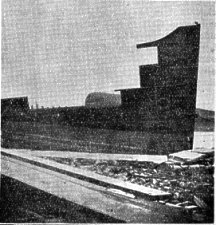
King Orry II. A bit of her still left
This was trading on the renown of the Manx fleet, and no mistake, for whom lead the King Orry not carried during nearly half a century? It appears that a most successful sale took place, and that " over 300 buyers attended on board from Birmingham, Manchester, Liverpool, Chester, &c.," when " record prices prevailed for the fittings, which were in good condition." The compliment is a little dubious, for it is hard to imagine the appurtenances of an Isle of Man boat in any other " condition " but good. At all events " cushions realised as much as 13s. apiece, chairs from 6s. to 8s. 6d. each, carpets ten guineas each," while " several sofas and settees fetched three guineas, and linoleum sold at high prices."
The writer knows those settees very well. He has seen trippers, who had embarked hilariously active, lying abjectly miserable upon them. " Tins "-we all know what they mean -were ominously conspicuous, some stationary, some gently sliding over the thick Axminster valued at ten guineas, at Llanerchymor, so recently as a few months back ! And the cushions?
He has watched handy stewards bearing these thirteen shillings worth of down in one hand and a drop of brandy in the other, deftly tacking their steps over the field of pitiable coufusion, but bent on a mission of sympathetic relief. And the three guinea sofas?-watched mothers hand their babies to strangers and sink back on them, wishing themselves dead and put over the ship's side.
For the King Orry was a " tender " boat as much beloved by sailors as disliked by trippers of the land. No " dirty slop " (lingo of the sea) was she, which would drive through a wave on an even keel, but a lively cork, gaily bobbing up and down like a " safe little schooner " in the way " Jack" most admires; and even while those scenes in the richly-endowed saloons were depressingly proceeding it would be an equally certain thing to find a couple of sturdy sailors, their watch " off," calmly smoking old black pipes, keeping deliciously upright under tine fo'cs'tle head, and dilating upon the splendid comforts of travelling on such a ship, the equal to which the Channel had never seen. So absurdly contrary is the difference of a point of view. Oh, those singular excursionists who pick out the few bad passages of a summer! They are lying, for practical purposes, dead.
But watch their recovery ! The steamer gets suddenly under the shelter of the island. Heads begin to pop up. Is there any tea ready? And some biscuits? What's become of my hat? Tommy, have you eaten Aunt Sarah's cake out of the little brown bag? Where is it? Ask the stewardess to lend me a comb. Half an hour afterwards the questioner is able and selfreliant, forgetful of the past, and briskly bartering for the best bedroom on 'the front.
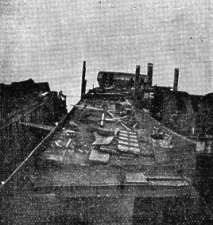
King Orry II On St. Valentine's Day
In spite of the transaction here recorded, it has been a surprise to many that the King Orry should have been broken up at all. In 1906 Snaefell II. was sold also to be " broken up." The writer watched them take the floats from her paddle wheels at Douglas, saw a Dutch tug make fast to her and start on a long tow to Rotterdam. Hollanders appear to know a good ship when they find one. Break her up as at first intended? Certainly not. She ran for years from Hamburg, and is probably running yet.
The King Orry (II.) was commanded by twenty different masters. The first was the late Captain Alex. M'Queen, then commodore, and for many years the " handsomest man sailing into the port of Liverpool." He was father of Captain Peter M'Queen, the late general manager of the Birkenhead Ferries, and formerly also in the Steampacket service.
Her last master was Captain Quine, a typically cool, clever, level-headed Manxman, who has risen all the way from a small start before the mast. The oldest living ex-commander of her is Captain Andrew Gibson, the retired commodore from the Empress Queen.
In the autumn of 1898 he earned some celebrity for a quick and clever piece of judgment. When the King Orry was four miles out of Douglas, on the morning trip, a woman jumped overboard from the fore part. Of course, the wheel would have been on her before she could breathe.
Not a speck or a sign of her could be seen, the vessel travelling at the rate of eighteen knots. Captain Gibson instantly posted a man at each masthead, with a glass, made a sweep round with his ship, and came back on his original course. The poor woman was picked up.
Shortly afterwards a passenger jumped overboard from a Holyhead mail boat, which was stopped as early as possible, and had a boat lowered. They had gone, without realising it, a greater distance than they imagined. A contrast between the two manoeuvres was made. Well, the romance of the old King Orry is ended.
We come now to King Orry (III.), which I cannot properly describe, because she is not quite finished yet. But let us, for this month, deal with the launch.
Somebody said, a long time ago, that a bride was happy if the sun shone upon her wedding. I wonder if this applies to a ship, and I hope it will in the case of the King Orry. Tuesday, March 11th, was very "rainy " early on, and the sky did no kind of credit to itself, but by noon Old Sol was shining in his best form, and everyone seemed happy.
Did you ever take part-I mean even that of a spectator-in the launch of a ship? However magnificent the establishment may seem it is only called a " yard "-a curious term embracing a good many things. The retail coal trade claims it with great pride; a ship thinks nothing about having a dozen attached to her, and then it is the commonest measure of length with which John Bull flouts the metric system. However, Cammell, Laird, & Co. have got a " yard " and it was a gay one, indeed, on King Orry's day. You should notice the ladies, all daintily rigged out--of course, you have to say " rigged " in connection with ships-picking their way among miscellaneous odds and ends, and being nearly tripped up by stones, and washers, and broken bolts, and curved pieces of steel, and wondering, especially when some desperate characters beneath the hull knock the wedges away, why the new ship doesn't (as she apparently ought to do) topple over? There is no doubt that ladies like to attend launches, but I have no recollection of them applying for leave to go on board the vessel to be launched. Supposing they did? What queer little screams we should be favoured with when the ship took the fatal plunge. As it is, the masculine element on board are evidently of another calibre. There they are, at the giddy height above, lolling over the bulwarks and grinning down pleasantly on those below. To them the plunge seems a very small matter indeed.
Bright as ladies' dresses are on these occasions, they seem to take but second place to the flags. And then there is the platform at the bows covered in red, and the tri-colour ribbons suspended from aloft, and the bottle of champagne (I hope it was a good brand) decorated, too, and all ready for heaving. You would fancy that these functions would form the centre of marked excitement, but this is a department to which only the onlooking lay persons at all contribute. Those concerned with the responsibilities proceed about their affairs with a rather irritating coolness and humdrum. They don't seem to have anything whatever to do with anything at all. A ship is called " a thing of life" and I must say that on these occasions she appears to look after herself and do whatever is required to be done on her own initiative.
At all events the King Orry did this You may have noticed in the papers that on account of her promised speed, she has already been nicknamed King Hurry. She began her career by justifying this title in great style. She hurried off into the river on her own account, two or three minutes before her time. Laird's have launched boats for getting on to a century, but they never had a launch easier, speedier, or sweeter than that of the King Orry. Yet I am sorry for her. Her baptismal name is wasted. She is sure to be called King Hurry. I wish someone would tell me what the Manx for hurry is, because that might be another improvement still.
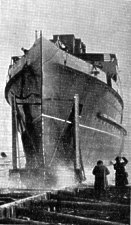
King Orry III. Her first plunge
When the launch was over-and it was in a much shorter time than it takes to tell-the gentlemen who had been laughing from above fastened the newly floating hull to the tugs which were waiting ready to hand, and almost before the company had reached the moulding loft, where luncheon was served, the King Hurry was berthed in the wet dock, and work aboard her merrily going on. Lunch in a moulding loft is a most agreeable notion, for here, again, the place is swathed in bunting, "flags of all nations" (as they say), except one representing the Isle of Man. However, above the chairman's man's head, to make up for it, there was a singular picture of what the famous King Orry was sure never to have been like as well as a view of the "trie cassyn", not too successfully drawn. I am told that, however easy it might seem, itis really very difficult to draw the Three Legs. I believe that Manx children, when early to school, are taught to begin by drawing the letter Y, and then adding suitable curls to suggest the lower limbs and the feet, and that even artists of standing have been known to start from so homely a basis.
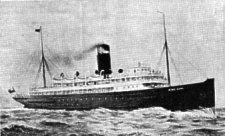
King Orry III as she will appear when we all see her very shortly
A number of rather good speeches followed the luncheon, Mr. Hichens and Mr. Carter, the two new heads of the great firm, doing very well in this line. Of course, as is the current fashion in England, a little doubt had to be delicately thrown on poor King Orry's claim to have first founded a representative parliament. Mr. Hichens-and here his memory beats mine hollow-said he remembered being taught at school that the invention began in the reign of Edward I, but this potentate was modern compared with King Orry, who, as we have seen, landed on the island 128 years before William the Conqueror took possession of our throne. But I quite agree with him that the real fame of King Orry will lie in the fact that the new steamer was built at Cammell, Laird's ! Mr. Carter was just splendid-he said the ship would be completed to time, and you know that's the point. But it lay with Mr. Maitland to make us laugh, and set me wondering whether he took upon himself to cheer up the House of Keys with a little humour now and then. Even Speakers, as our own House of Commons can testify, may be pleasantly human you know, and so can grave judges like Mr. Justice Darling, and magistrates like the inimitable Mr. Plowden. Mr. Maitland said that tourists were always boasting that they were never so happy as when at sea, but, if not taken to the island in three hours they always grumbled! (much laughter) and them he reminded us that the new King Orry was going to ply, not always to Liverpool — but to the adjacent islands (applause). I should call this a broad hint to Glasgow and Dublin-the latter in particular.
There were also present many who did not make a speech. There was the Consul for Uruguay, one of the most charming men in Liverpool. But I expect he will be telling them in Monte Video all about the King Orry, and I shouldn't wonder if Mr. Mahanovitch, the big local shipowner there, popped over to gather a few useful hints from the new boat. You never know. Indeed, and there were more besides. The new commander-elect, for instance, Captain Bridson, like a certain historical person, thinks nothing whatever of defying lightning, storms, and those kind of things, but he was probably shaking in his shoes for fear of being called upon to say " a few words."
Afterwards we prowled about the " yard " to see the great double-ended boilers ready to go in the ship, and there, as well, was the huge funnel, which an electric crane picked up and coolly ran away with. I suppose before one can say " Jack Robinson," these things will be ready in their places and Captain Bridson mounting the bridge
|
|
||
|
|
||
|
Any comments, errors or omissions gratefully received
The Editor |
||